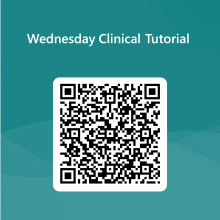Wednesday Tutorials
Purpose: Wednesday tutorials are for all trainees in GP posts (both ST1s and ST2s in their first GP post, and ST3s). The focus of these sessions is knowledge, application in practice and helping you to cover a broad range of the RCGP curriculum. Many will help you with AKT and SCA preparation; others are aimed at practical everyday things, or more difficult to get to areas. They are delivered by Trainees supported by their Trainers. So, you will need to pick a date and a topic title and then liaise with your trainer on how to structure and deliver the session. This will help you develop your teaching skills too. Remember to think about how best you can make your session interactive. Don’t forget to reflect on the feedback from the session and log the event in your portfolio under ‘Maintaining performance, learning and teaching – maintaining performance and effective CPD for oneself and others’
Where: The sessions are currently being held on Zoom.
The dial in details for the Zoom call are as follows;
Meeting ID: 830 5247 2409
Passcode: 343391
After the session has taken place please complete the Evaluation Form to provide some feedback to the Trainee and Trainer facilitating the session:
Please note it is the responsibility of the Trainee facilitating these sessions to ensure the evaluation form is completed. Admin will forward any feedback received onto the presenter as soon as possible following the session taking place.
If you do not work Wednesday’s please consider whether it would be beneficial for your development to attend one of these sessions.
If you do work Wednesday’s and are unable to attend please let Admin know prior to the session taking place otherwise the absence will be recorded as unauthorised.
Time: The session runs from 1.30pm – 2.45 pm. They start punctually – so try to get there on time!
Trainees have suggested the topics they may find helpful for Wednesday tutorials. You may find it helpful to review these before deciding on a topic for your tutorial.
You can access the list of presenters (initials only) and their topics as they are updated here
Feedback and Evaluation
Feedback is an excellent way to evaluate and refine your teaching methods. We would encourage you to ask the trainees that attend your session to complete a feedback form for you. You can upload the results on to your e-portfolio under the MPLT capability.
You can use the QR code or link below to request feedback after your presentation.

QR code not working? Follow the link here: https://forms.office.com/r/vy3SW5eC1B
Resources
You may find the following resources helpful when preparing your tutorial;
How to design a Teaching Session
The following guiding principles may help you with constructing your session.